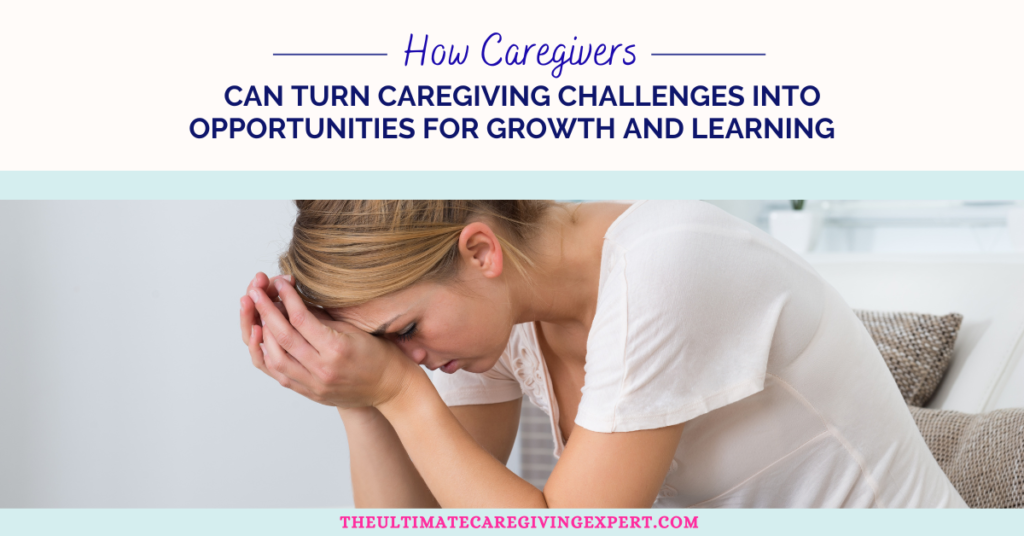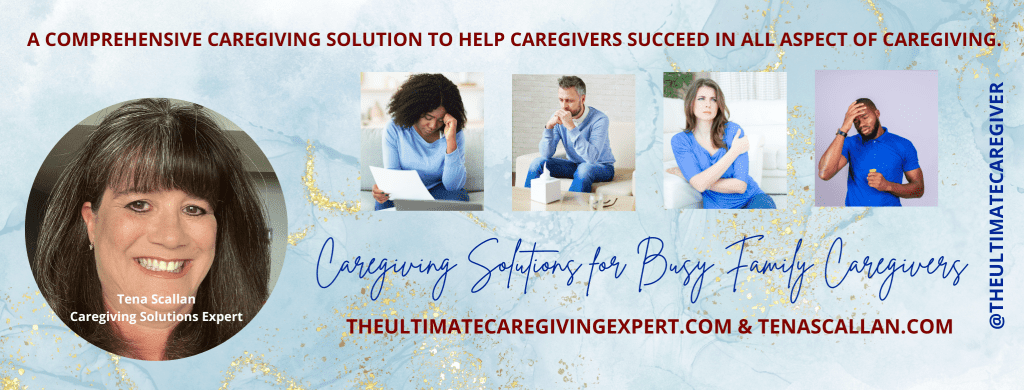Turn Caregiving Challenges into Opportunities
Caregiving is a profound journey that entails much more than the practical tasks of attending to someone’s needs. It’s a journey that weaves together moments of tenderness, resilience in the face of adversity, and the deepening of bonds with those we care for. However, this path also comes with its share of challenges—physical, emotional, and logistical—that can test the limits of caregivers. Yet, within these challenges lie profound opportunities for personal growth and learning, where each obstacle becomes a stepping stone toward greater empathy, resilience, and self-discovery.
Recognizing the Complexities of Caregiving
Navigating the realm of caregiving involves far more than the mere fulfillment of tasks; it encompasses a multifaceted array of responsibilities. From diligently managing intricate medical requirements to providing unwavering emotional support, caregivers are tasked with balancing myriad roles. While these complexities can indeed feel daunting, they concurrently serve as fertile ground for cultivating invaluable skills and gaining profound insights. Here are some ways caregivers can turn challenges into opportunities:
-
Time Management:
Learning to prioritize tasks and manage time efficiently is crucial for caregivers who often have multiple responsibilities and deadlines to juggle. Effective time management allows caregivers to:
- Prioritize Care Tasks: Identify and focus on the most critical tasks that require immediate attention.
- Create Schedules: Establish daily or weekly schedules to allocate time for caregiving duties, personal tasks, and self-care.
- Use Tools and Techniques: Utilize tools such as calendars, task lists, and reminders to stay organized and on track.
- Delegate Responsibilities: Delegate tasks to other family members or support professionals when possible to lighten the workload.
- Set Realistic Goals: Break down larger tasks into smaller, manageable steps to avoid feeling overwhelmed.
-
Adaptability:
Caregivers must be adaptable to navigate the unpredictable nature of caregiving, where circumstances can change rapidly. Developing adaptability involves:
- Flexibility: Being open to adjusting plans and routines based on the changing needs and conditions of the care recipient.
- Problem-Solving Skills: Quickly assessing new situations and finding creative solutions to address challenges that arise.
- Emotional Resilience: Maintaining a positive attitude and managing stress effectively in response to unexpected events.
- Continuous Learning: Seeking new information and skills to stay informed about advancements in caregiving practices and medical treatments.
- Seeking Support: Knowing when to reach out for assistance from healthcare professionals, support groups, or family members during challenging times.
-
Empathy and Compassion:
Enhancing empathy and compassion allows caregivers to provide not only physical but also emotional support to their loved ones. Ways to enhance empathy and compassion include:
- Active Listening: Paying close attention to verbal and non-verbal cues to better understand the feelings and needs of the care recipient.
- Putting Oneself in Their Shoes: Imagining oneself in the care recipient’s situation to gain perspective and respond with empathy.
- Validation: Acknowledging the emotions and experiences of the care recipient without judgment or criticism.
- Self-Reflection: Taking time to reflect on one’s own emotions and experiences to better empathize with others.
- Seeking Support: Connecting with other caregivers or professionals to discuss challenges and share experiences, which can enhance empathy through shared understanding.
These skills are essential for caregivers to provide compassionate and effective care while maintaining their own well-being.
Nurturing Self-Care Amidst Responsibilities
Amidst the demanding responsibilities of caregiving, caregivers often neglect their own well-being, focusing tirelessly on the needs of their loved ones. However, prioritizing self-care is crucial not only for maintaining personal health but also for sustaining the quality of care provided. Neglecting self-care can lead to burnout and diminished emotional resilience, ultimately affecting the caregiver’s ability to provide effective support. By establishing routines, seeking emotional support, taking breaks, setting boundaries, and considering professional help, caregivers can maintain their physical and mental health, reduce stress, and approach their responsibilities with renewed energy and compassion. Here are key strategies for caregivers to enhance their well-being:
-
Self-Care Routine:
Establishing a regular self-care routine is essential for caregivers to maintain their physical, emotional, and mental well-being amidst their demanding responsibilities. This routine may include:
- Physical Exercise: Engaging in regular physical activity to improve stamina, reduce stress, and promote overall health.
- Relaxation Techniques: Practicing relaxation methods such as deep breathing, meditation, or yoga to reduce tension and promote relaxation.
- Healthy Eating Habits: Maintaining a balanced diet to sustain energy levels and support overall health.
- Quality Sleep: Prioritizing adequate and restful sleep to recharge and enhance cognitive function.
- Pursuing Hobbies: Carving out time for enjoyable activities and hobbies that provide relaxation and personal fulfillment.
Establishing and maintaining a consistent self-care routine allows caregivers to replenish their energy reserves, reduce stress levels, and enhance their ability to provide effective care.
-
Seeking Support:
Connecting with support groups or counseling services is crucial for caregivers to receive emotional support, guidance, and understanding from others who are facing similar challenges. This support can take several forms:
- Support Groups: Joining local or online support groups specifically for caregivers, where individuals can share experiences, exchange advice, and provide mutual encouragement.
- Counseling or Therapy: Seeking professional counseling or therapy to explore feelings, manage stress, and develop coping strategies for caregiver-related challenges.
- Peer Support Networks: Building connections with other caregivers through social networks, community organizations, or caregiver-specific events.
By connecting with others who understand their experiences, caregivers can gain valuable insights, reduce feelings of isolation, and receive practical support to navigate their caregiving journey more effectively.
-
Setting Boundaries:
Learning to set boundaries is essential for caregivers to maintain their own well-being and prevent burnout. Setting boundaries involves:
- Identifying Limits: Recognizing personal limitations in terms of time, energy, and emotional capacity for caregiving responsibilities.
- Saying No: Assertively declining additional tasks or commitments that exceed reasonable limits or compromise personal well-being.
- Communicating Needs: Clearly communicating needs and expectations to family members, friends, and healthcare professionals involved in caregiving.
- Allocating Personal Time: Carving out dedicated time for self-care, relaxation, and activities that promote personal fulfillment and recharge energy levels.
- Seeking Assistance: Enlisting the help of other family members, friends, or professional caregivers to share responsibilities and alleviate the caregiving load.
Setting and maintaining boundaries allows caregivers to prioritize their own needs, maintain a healthy balance between caregiving and personal life, and sustain long-term caregiving efforts with resilience and compassion.
Turning Challenges into Learning Opportunities
Every challenge faced in caregiving offers caregivers a chance for personal growth and resilience. By viewing difficulties as opportunities, caregivers can develop stronger problem-solving skills, deepen their empathy, and strengthen their emotional resilience. Embracing these challenges as learning experiences enriches their caregiving journey with greater meaning and fulfillment, fostering both personal and professional growth. Consider these approaches:
-
Problem-Solving Skills:
Effective problem-solving skills are essential for caregivers to navigate the challenges they encounter in providing care. Developing these skills involves:
- Identifying Challenges: Recognizing and understanding the specific challenges or issues that arise in caregiving situations.
- Analyzing Options: Considering different approaches or solutions to address the identified challenges.
- Decision-Making: Making informed decisions based on careful evaluation of available options and potential outcomes.
- Implementing Solutions: Taking action to implement chosen solutions and monitoring their effectiveness.
- Evaluating Results: Assessing the results of implemented solutions and making adjustments as needed.
By honing their problem-solving skills, caregivers can become more adept at managing complex situations, improving care outcomes, and reducing stress associated with caregiving responsibilities.
-
Continuous Learning:
Pursuing education or training related to caregiving is crucial for caregivers to stay informed about best practices, new developments in healthcare, and effective caregiving techniques. Continuous learning involves:
- Staying Updated: Keeping abreast of current research, guidelines, and advancements in caregiving and healthcare.
- Professional Development: Attending workshops, seminars, or online courses that offer specialized training in caregiving skills and techniques.
- Seeking Knowledge: Consulting reputable sources such as healthcare professionals, support organizations, and caregiving associations for reliable information and resources.
- Networking: Engaging with other caregivers, healthcare providers, and experts in the field to exchange knowledge, share experiences, and seek advice.
By investing in continuous learning, caregivers can enhance their knowledge base, improve caregiving practices, and adapt to evolving challenges and needs of the care recipient.
-
Building Patience:
Cultivating patience and emotional resilience is essential for caregivers to manage the daily stressors and uncertainties that accompany caregiving responsibilities. Strategies for building patience include:
- Mindfulness: Practicing mindfulness techniques to stay present and manage stress in the moment.
- Self-Reflection: Taking time to reflect on emotions and reactions to develop self-awareness and emotional regulation.
- Empathy: Understanding and empathizing with the feelings and experiences of the care recipient, which can promote patience and compassionate care.
- Stress Management: Utilizing relaxation techniques, such as deep breathing or progressive muscle relaxation, to reduce stress and enhance emotional resilience.
- Seeking Support: Connecting with support networks, counseling services, or peer groups to share challenges, seek advice, and receive emotional support.
By cultivating patience and emotional resilience, caregivers can maintain a positive outlook, respond effectively to caregiving demands, and sustain compassionate care over the long term.
Building Meaningful Connections
Caregiving, despite its challenges, offers caregivers opportunities to build meaningful connections both within their families and with the broader community. Beyond the personal sacrifices and responsibilities, caregivers find avenues to deepen bonds with their loved ones through shared experiences and mutual support. Additionally, caregiving provides opportunities to connect with other caregivers, forming networks of support and solidarity that enhance resilience and emotional well-being. These connections can provide emotional support and a sense of belonging:
-
Family Bonding:
Strengthening bonds with family members through shared caregiving experiences can enhance mutual understanding, support, and solidarity within the family unit. Ways to foster family bonding through caregiving include:
- Open Communication: Creating opportunities for open and honest communication about caregiving responsibilities, challenges, and emotional experiences.
- Shared Decision-Making: Involving family members in discussions and decisions related to caregiving tasks and responsibilities.
- Team Approach: Collaborating as a team to divide caregiving responsibilities based on each family member’s strengths and availability.
- Expressing Gratitude: Recognizing and expressing gratitude for the contributions and support of each family member involved in caregiving.
- Quality Time: Setting aside dedicated time for meaningful interactions, shared activities, and emotional support among family members.
By nurturing family bonds through caregiving, families can strengthen their relationships, build resilience, and create lasting memories amidst the challenges they face together.
-
Community Involvement:
Engaging with local support groups or volunteer organizations provides caregivers with opportunities to connect with others facing similar challenges and access valuable resources. Benefits of community involvement include:
- Peer Support: Connecting with other caregivers who understand the unique demands and experiences of caregiving.
- Information and Resources: Accessing information, educational workshops, and practical resources offered by community organizations and support groups.
- Emotional Support: Receiving empathy, encouragement, and validation from others in similar caregiving roles.
- Social Interaction: Combatting feelings of isolation and loneliness by participating in group activities, events, or online forums.
- Advocacy and Awareness: Collaborating with community organizations to advocate for caregiver rights, raise awareness about caregiving issues, and promote supportive policies and services.
Community involvement not only enhances caregivers’ support networks but also empowers them with knowledge, resources, and emotional resilience to navigate their caregiving journey more effectively.
-
Networking:
Building a network of fellow caregivers for mutual support and advice fosters a sense of community, camaraderie, and shared understanding. Strategies for networking among caregivers include:
- Joining Support Groups: Participating in local or online support groups specifically for caregivers to share experiences, exchange practical advice, and offer emotional support.
- Attending Workshops and Conferences: Engaging in educational events, workshops, or conferences focused on caregiving topics to network with professionals and other caregivers.
- Utilizing Social Media: Connecting with caregivers through social media platforms or online forums dedicated to caregiving discussions and support.
- Volunteering: Contributing time and expertise to volunteer organizations or caregiving-related initiatives, which can facilitate networking opportunities and expand support networks.
- Peer Mentoring: Establishing relationships with experienced caregivers who can provide mentorship, guidance, and encouragement based on their own caregiving experiences.
By networking with fellow caregivers, individuals can share insights, learn from each other’s experiences, find emotional support during challenging times, and build enduring connections that strengthen their caregiving journey.
Conclusion: Embracing the Growth Potential of Caregiving
Caregiving is not without its challenges, but by approaching these challenges with a positive mindset, caregivers can transform them into opportunities for personal growth and learning. Each obstacle faced presents a chance to develop resilience, compassion, and valuable life skills. Remember, the journey of caregiving is as much about self-discovery as it is about caring for others. If you’re currently navigating the challenges of caregiving, remember that you’re not alone. Seek out support from resources like caregiver support networks or self-care guides to help you along the way. Embrace the growth opportunities that caregiving presents, and continue to nurture both your loved ones and yourself with compassion and resilience.





